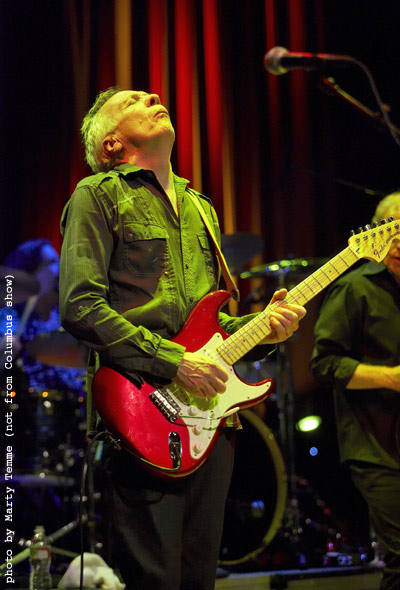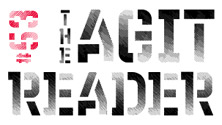
Newport Music Hall, Columbus, June 18
by Jennifer Farmer
Excuse me while I digress, but Father’s Day has me feeling quite sentimental, and the fact that Robin Trower coincided with the week of Father’s Day has turned my emotions into a rollercoaster. Cliched as it may be, my father and I were never exactly what one would refer to as “two peas in a pod” while I was growing up. I played and excelled at almost every sport I could cram into a seven-day week, desperately seeking his approval, which came in those rare moments of emotion during a congratulatory hug after a big win in softball or a qualifying long jump in track. It’s not that he wasn’t proud of me—that he would tell me over and over again, which meant more than words can explain—but we never had that bond outside of sports that many fathers and daughters share.
It wasn’t until I moved out of the house and started my own life in college that I realized sports weren’t our true bond; music was what brought us together. Growing up, I shared a love of all (with the exception of maybe non–Greatest Hits albums from Megadeth) of his records. Though at the time it was a bit embarrassing having him call me “Dave Mustaine” after my notoriously unruly blond hair, in retrospect, I can now fully appreciate the father that drove down the main drag in our hometown, pulling up next to cars and blasting Iron Maiden from the speakers of the 1987 Toyota, affectionately known amongst our family as the “Black Barchetta.” (Yes, that’s a Rush reference, another band, for better or worse, that we also happen to fancy.) That being said, it was my father that first introduced me to the awe-inspiring guitar playing of Robin Trower. It was my father, not history class, which taught me about the infamous Bridge of Sighs via Trower’s lyrics. Needless to say, Robin Trower’s music is dear to my heart, and luckily, his guitar-playing skills warrant the adoration and affection I have for him. I reveled in the chance to catch him live (my first time ever!) at the Newport during a U.S. tour stop in Columbus last week. I may, admittedly, have been a bit biased going into the show, but I placed that bias neatly on the shelf when I went in, knowing I would eventually be writing a review. In the end, however, no amount of partiality could have distorted the fact that Trower played that rare type of show capable of changing lives and opening eyes.
Words, in fact, seem futile when summing up the awe-inspiring ease and superb tone with which Trower plays his custom-built Fender Stratocaster. It is a sound that one must hear live in order to understand. The odd contradiction about Trower is that he plays with the intensity and fury of his younger years, yet he seems so serene on stage, as though playing guitar was the only thing he was put on earth to do, and the stage is right where he belongs. Though far-removed appearance wise from the days of the Dutch-boy haircut and fringe, calf-length boots, his sound is spot-on, as though time, line-up changes and even the deaths of former members could not shake the infallible guitarist. In fact, Trower still uses that same model Strat that made him famous, the only difference now is that the guitar bears his name, as Fender recently released a special line of guitars in his honor.
This night at the Newport, Trower and his band blistered through a near two-hour set, taking no breaks and delighting in the crowd’s enthusiasm along the way. Before Trower took the stage, throngs of eager mustache- and mullet-sporting men packed the beer line bar-to-wall and traded Trower tales and expertise, each dressed in his vintage Bridge of Sighs–era concert t-shirt, or older still, souvenirs from Trower’s Procol Harum days. Wandering amongst remnants of a surely more carefree time, I found myself wishing desperately that my father could be enmeshed among them, albeit without the facial hair or bad haircut.
When Trower and company took the stage and played the first few chords of “Twice Removed from Yesterday,” the packed house went crazy, then hushed in awestruck silence. Though it seemed that Trower could do no wrong (and indeed, with guitar in hand, this mantra inevitably holds true), perhaps he should have stayed away from the microphone, as he typically does, and left the singing to the band’s actual vocalist, Davey Pattison, for that one song. Singing may be Trower’s Achilles’ heel, but Pattison is one of those enigmas, where the outward appearance doesn’t quite match the sound the vocal chords produce. It’s difficult to imagine such a resplendently smooth voice coming out of the petite, graying, glasses-sporting man, who looks as though he could be anyone’s father or husband or brother. Looks are deceiving in this case, as he sounds hauntingly similar to Trower’s original singer, James Dewar, who passed away in 2002.
Throughout the night, Trower blazed through a set seamlessly mixed with newer, mellower tunes off of his 2003 release, Living Out of Time, and thunderous, crowd-pleasing favorites spanning three decades. The largest reaction came when he played that first booming hook of “Day of the Eagle,” and then followed with an effortless transition into the heartbreaking and infamous “Bridge of Sighs,” both tracks off the 1974 album bearing the latter’s name. The long, slow songs were just that—long and mellow—however, Trower’s guitar prowess made them fly by, never languishing into conversation-inducing background music, with all the key changes, chord progressions and jaw-dropping guitar solos along the way. He left the crowd, including myself, yearning for more tunes with which to sway. The definitive highlight of the night was a passionate and powerful rendition of “Victims of the Fury.” So pleased was Trower with the crowd’s reaction that the notoriously talk-shy guitarist actually stepped forward to acknowledge the renewed energy, praising bandmates Pattison, Pete Thompson and Glenn Letsch, and extolling the fans for their enthusiasm. Trower and company closed the set with a comparatively bluesy rendition of their signature sign-off, “Little Bit of Sympathy,” but of course, came out to feed the hungry crowd an encore from Sighs, the heavily anticipated “Too Rolling Stoned.”
Though my father was not able to share in my first Robin Trower experience in person, I now, finally, after all these years, understand what he feels when he sees or hears Robin Trower, and this has been fodder for scores of conversations over the past Father’s Day weekend. There is a real and mysteriously profound bond in sharing a love of a common experience, regardless of the time and place, and I think I can definitively say that my father and I are in the midst of this phenomenon. Music really does bring people together—hell, my dad and I are living breathing proof of this cliche—and if that means going to many more shows in coming years, I have nothing to complain about. I can only hope all these future shows are as eye-opening (and brilliant-sounding) as Robin Trower at the Newport. Oh, and Happy Father’s Day, Dad.
Depeche Mode, The Dark Progression
Yeah Yeah Yeahs Live Review
Metal Machine Music: Nine Inch Nails and the Industrial Uprising
King Khan and the Shrines Live Review
Chrome Cranks Live Review
The Pains of Being Pure at Heart and Franz Ferdinand Live Reviews
Wilco, Ashes of American Flags
Live reviews of Throbbing Gristle and Diplo
Dinosaur Jr. Live Review
Morrissey Live Review
Primal Scream Live Review
SXSW 2009 Wrap-up
Mötley Crüe Live Review
Tindersticks and Davila 666 Live Reviews
